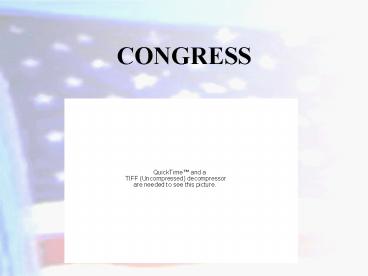CONGRESS PowerPoint PPT Presentation
1 / 18
Title: CONGRESS
1
CONGRESS
2
3
Roots of the Legislative Branch
- The U.S. Congress was greatly influenced by the
American colonial experience and by the Articles
of Confederation. - Under the British, colonial assemblies were
chosen as advisory bodies to the royal governors.
- These assemblies gradually assumed more power and
authority in each colony, eventually gaining
responsibility over taxation and spending. - The weaknesses of the Articles led to the
Philadelphia Convention in 1787.
4
The Constitution and the Legislative Branch
- Article I creates a bicameral legislative branch
of government. - The upper house is called the Senate in which
each state receives two representatives. - The lower house is called the House of
Representatives which is apportioned by
population. - The Senate has a 6 year term with 1/3 of the
seats up for reelection every two years. - House members serve 2 year terms.
5
Key DifferencesHouse Senate
- advise and consent
- 6-year term
- 100
- Foreign policy
- Initiate revenue bills
- 2-year term
- 435
- Tax policy
6
Congressional Profile
7
Congressional Directory
8
Apportionment and Redistricting
- The Constitution requires that all Americans be
counted every 10 years by a census. - The census determines the representation in the
House of Representatives. - Redistricting (the redrawing of congressional
districts to reflect changes in seats allocated
to the states from population shifts) is done by
state legislatures and, of course, always has
political overtones. - When the process is outrageously political, it is
called gerrymandering and is often struck down by
the courts.
9
Powers of Congress
- The most important constitutional power of
Congress is the power to make laws. - This power is shared by the House and the Senate.
- In order to become a law, a bill must be passed
by both the House and the Senate.
10
Regulate Commerce
Spend Money
Taxation
Create Courts
Powers of Congress
Lawmaking
Declare War
Make all laws "necessary and proper" to carrying
out the enumerated powers
11
The Representational Role of Members of Congress
- How should an elected official represent his/her
constituents? - Trustee--representatives use their own best
judgment - Delegate--representatives vote the way their
constituents want them to - Politico--representatives act as trustee or
delegate depending on the issue - Partisan representatives vote with their party
leadership
12
Organization of Congress
- Every two years, a new Congress is seated.
- The first order of business is the election of
leaders and adoption of new rules. - Both houses of Congress are organized on the
basis of party for both leadership and committee
purposes.
13
Lawmaking
- Only a member of the House or Senate may
introduce a bill but anyone can write a bill. - Over 9,000 bills are proposed and fewer than 5 to
10 are enacted. - Most bills originate in the executive branch.
- A bill must survive three stages to become a law
committees, the floor, and the conference
committee. A bill can die at any stage.
14
(No Transcript)
15
How Members Make Decisions
Interest Groups
Colleagues
Caucuses
Party
Representative
Constituents
Staff
Political Action Committees
16
Congress and the President
- Especially since the 1930s, the president has
seemed to be more powerful than Congress. - However, Congress retains several key powers
vis-a-vis the president - funding powers
- oversight
- impeachment/removal.
17
Congressional Oversight of the Executive Branch
- Congress has the power to review the actions of
the executive branch - Congressional oversight is used to ensure that
the bureaucracy is enforcing and interpreting
laws the way Congress intended.
18
Whats happening in Congress Today?

